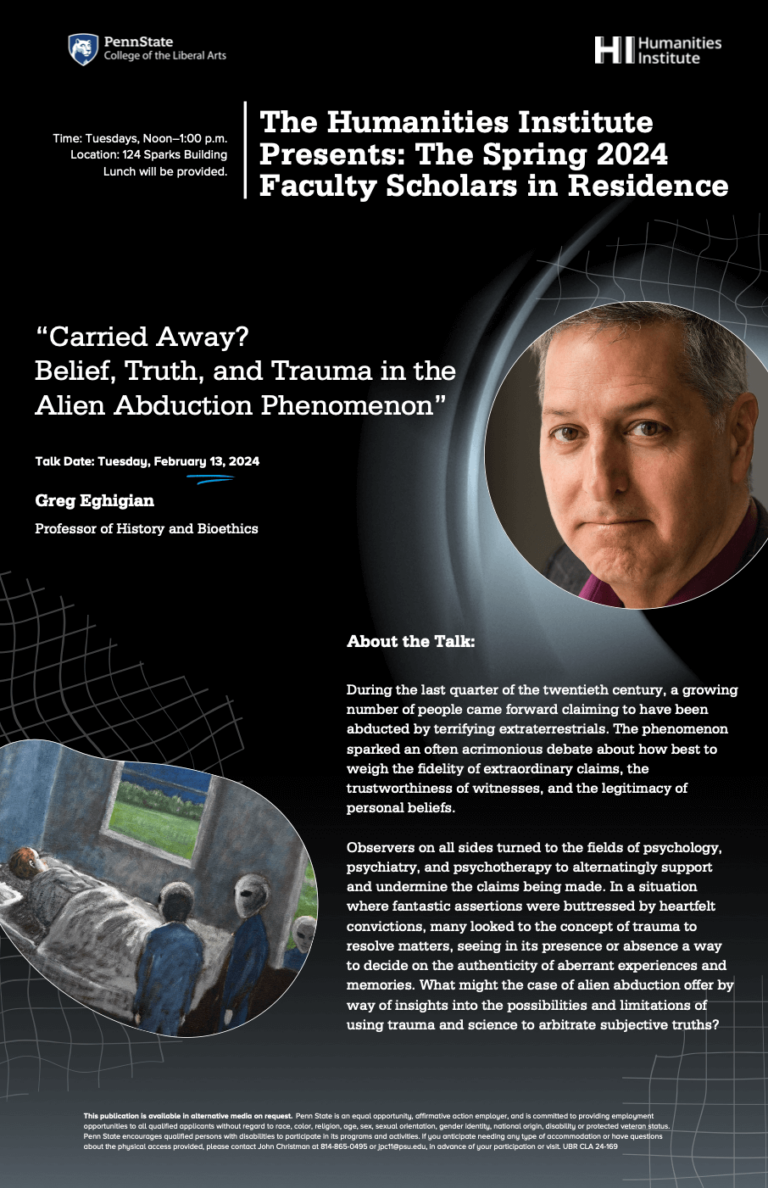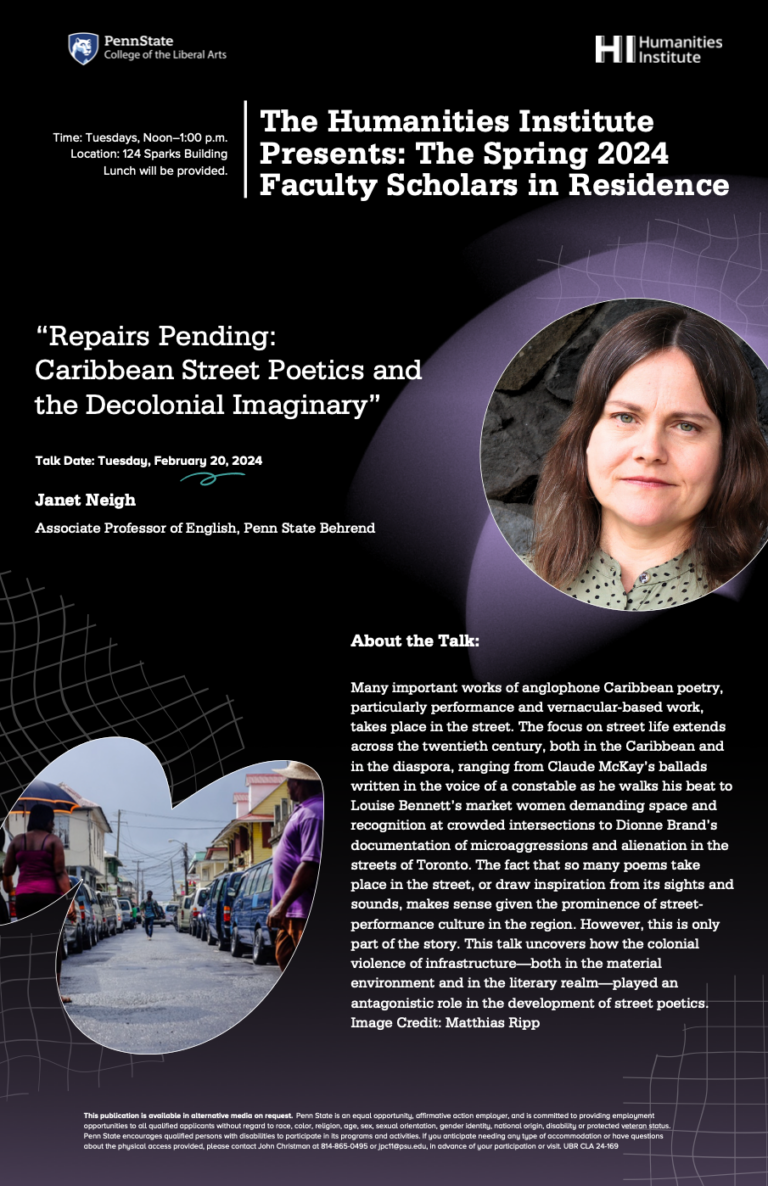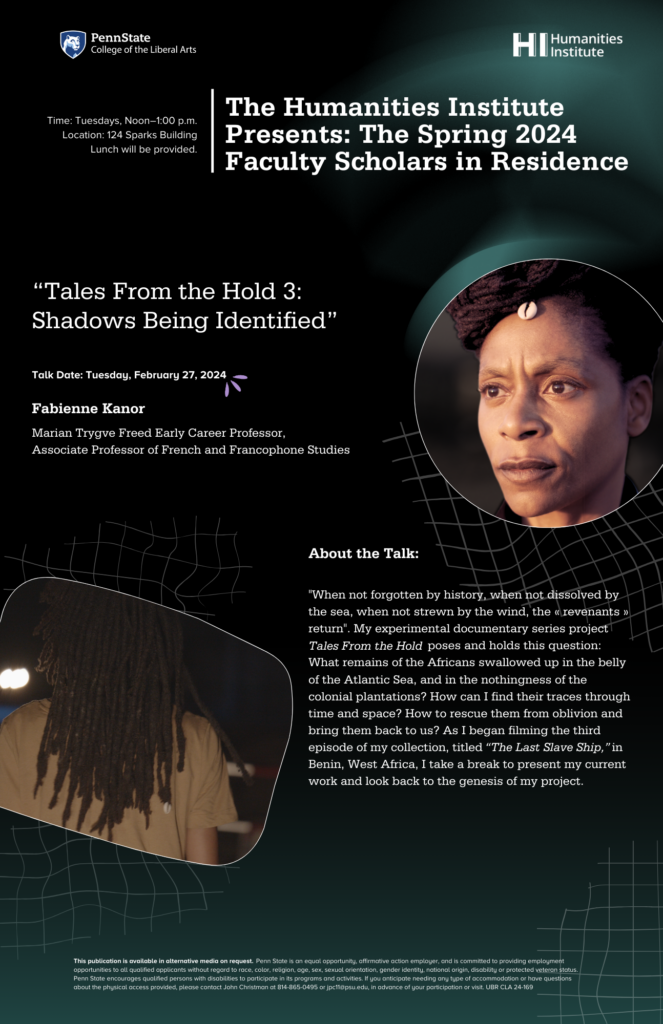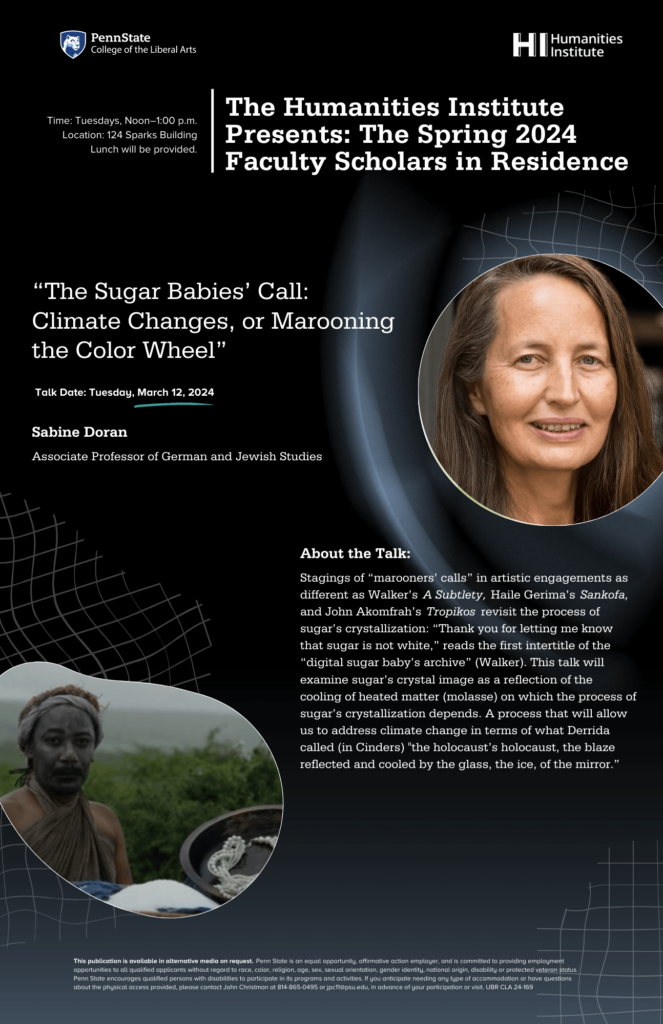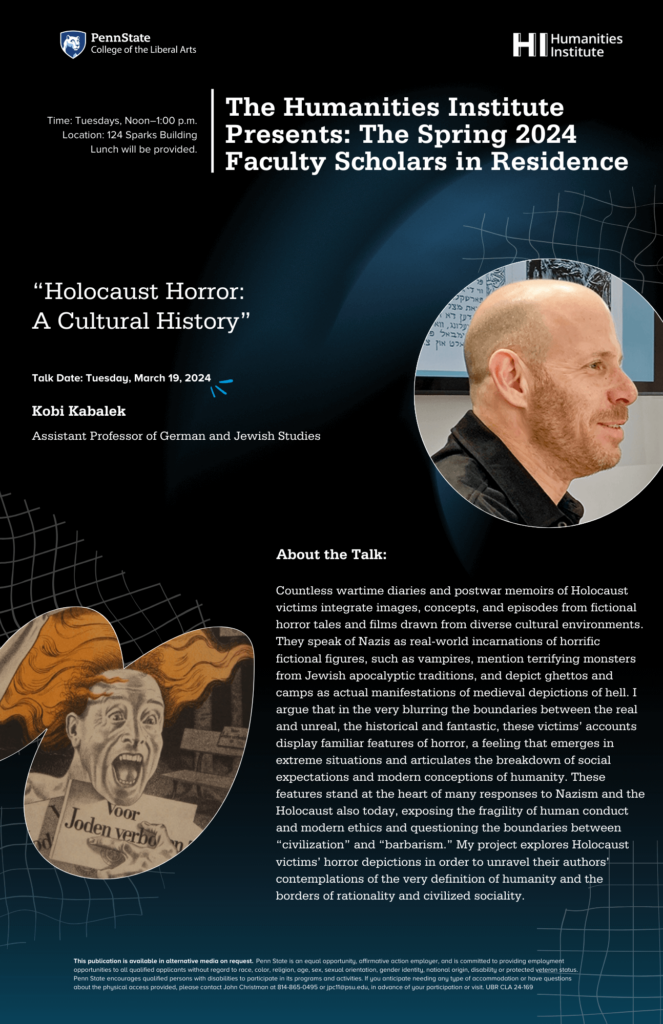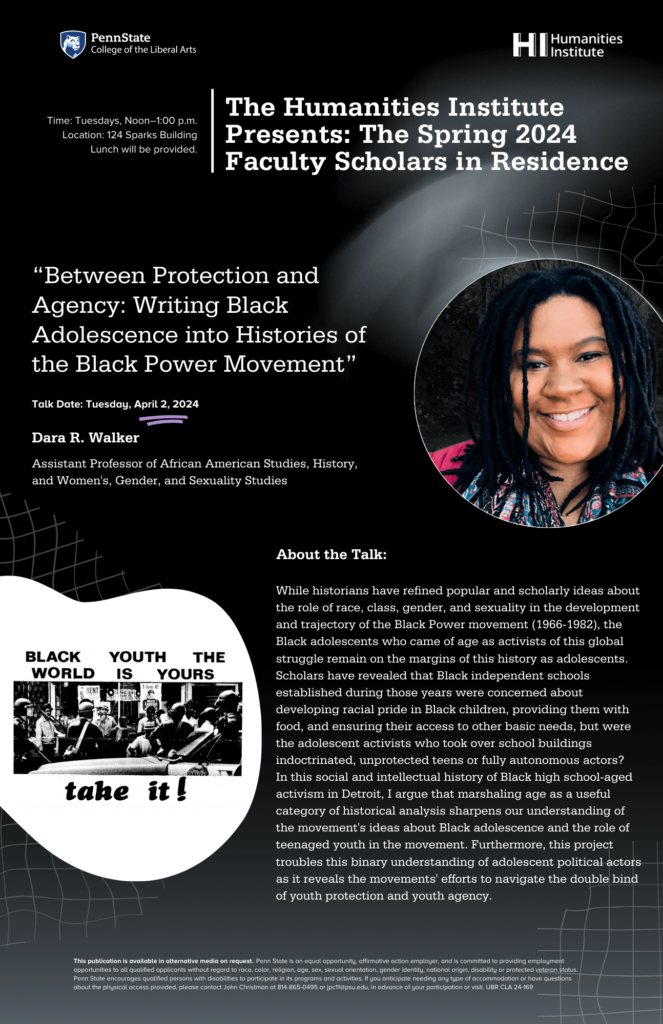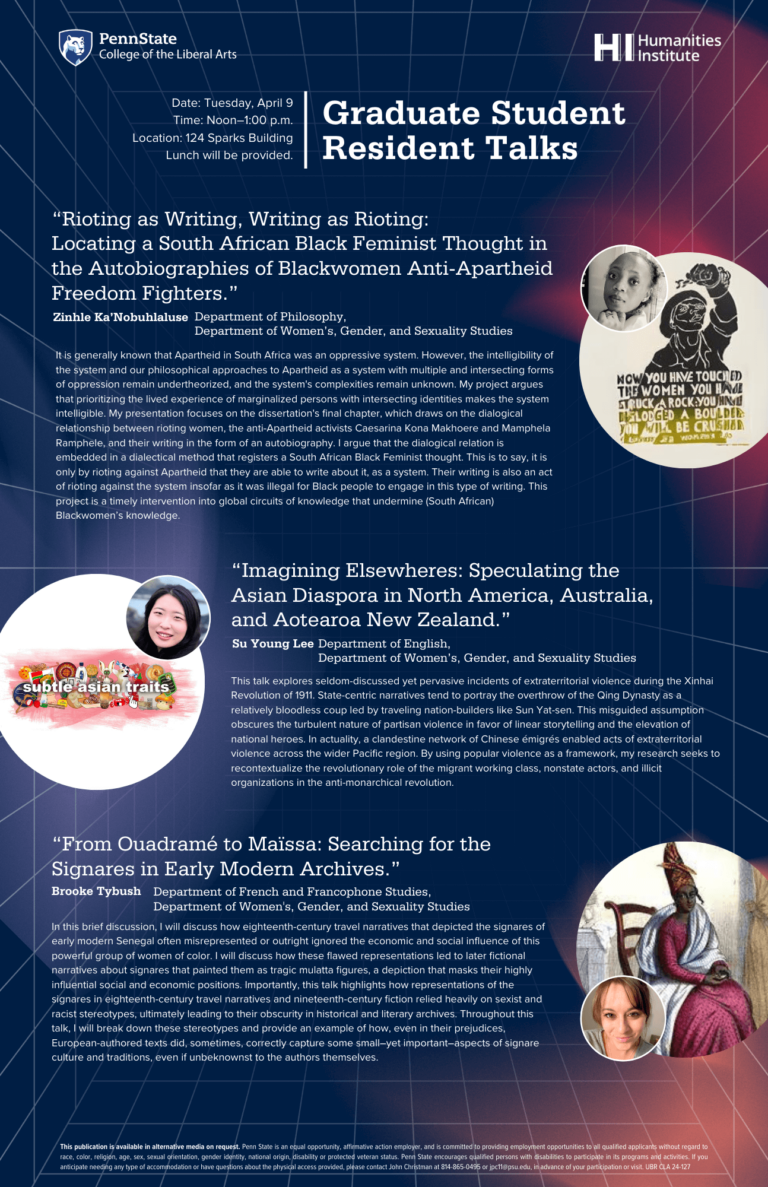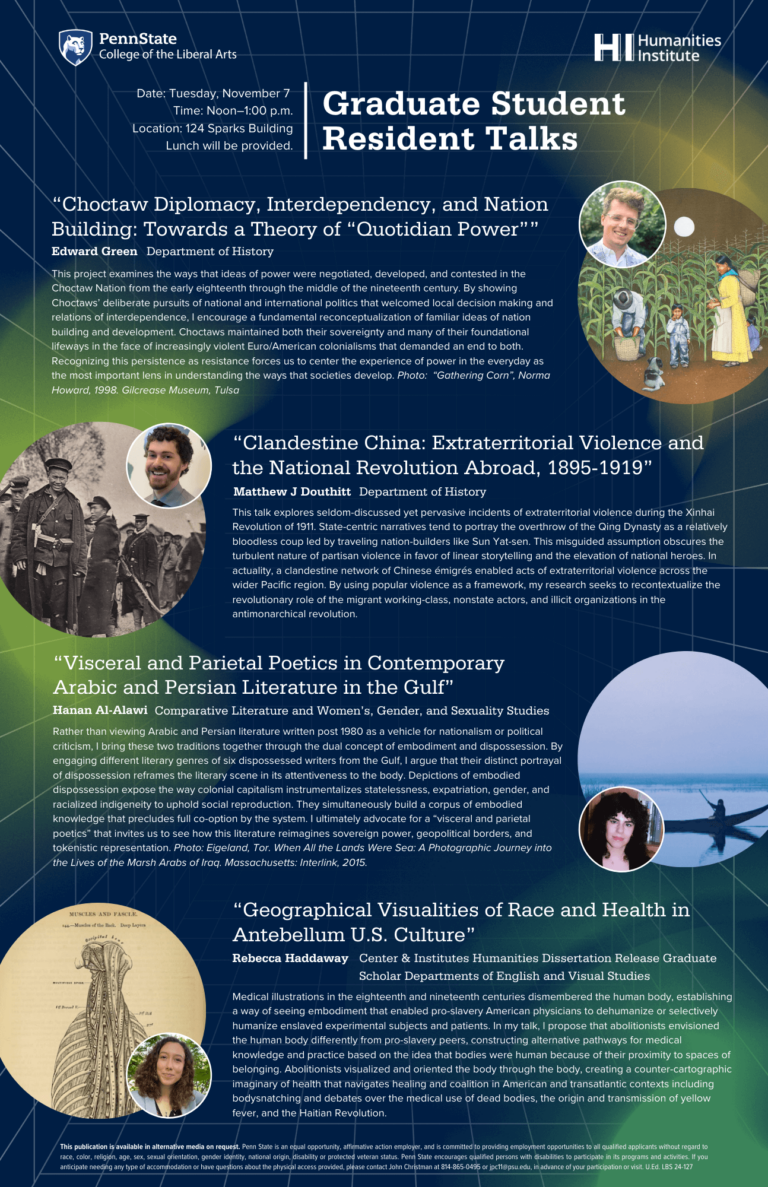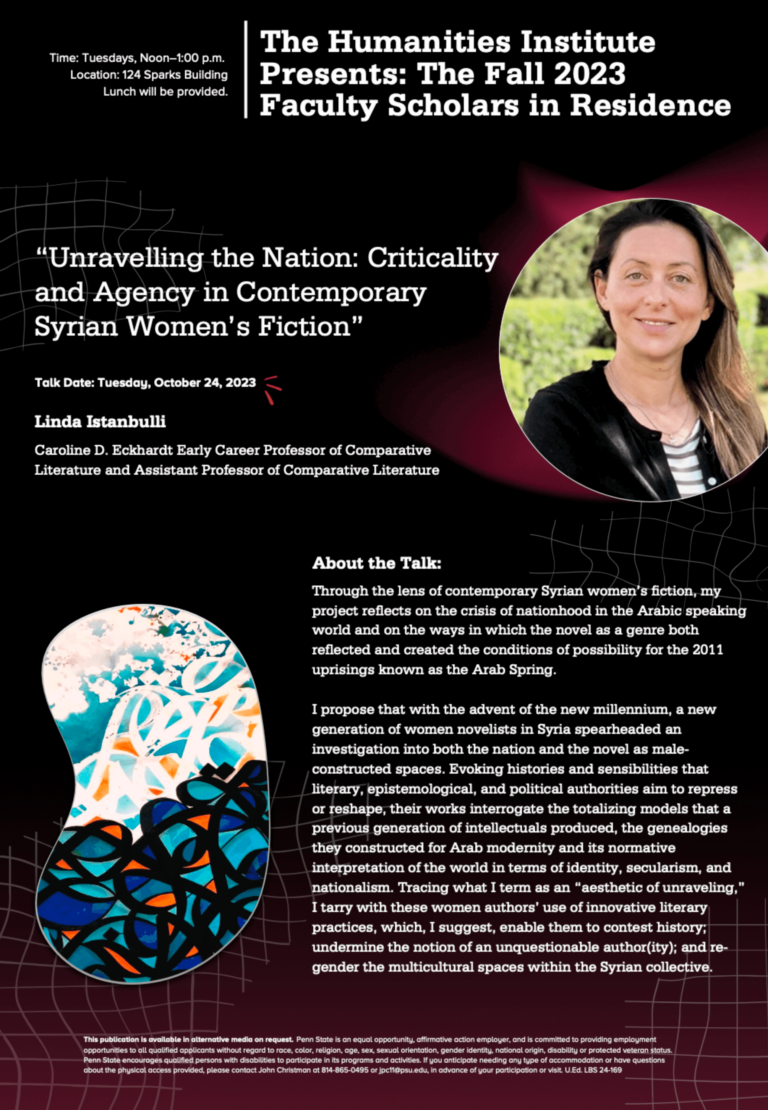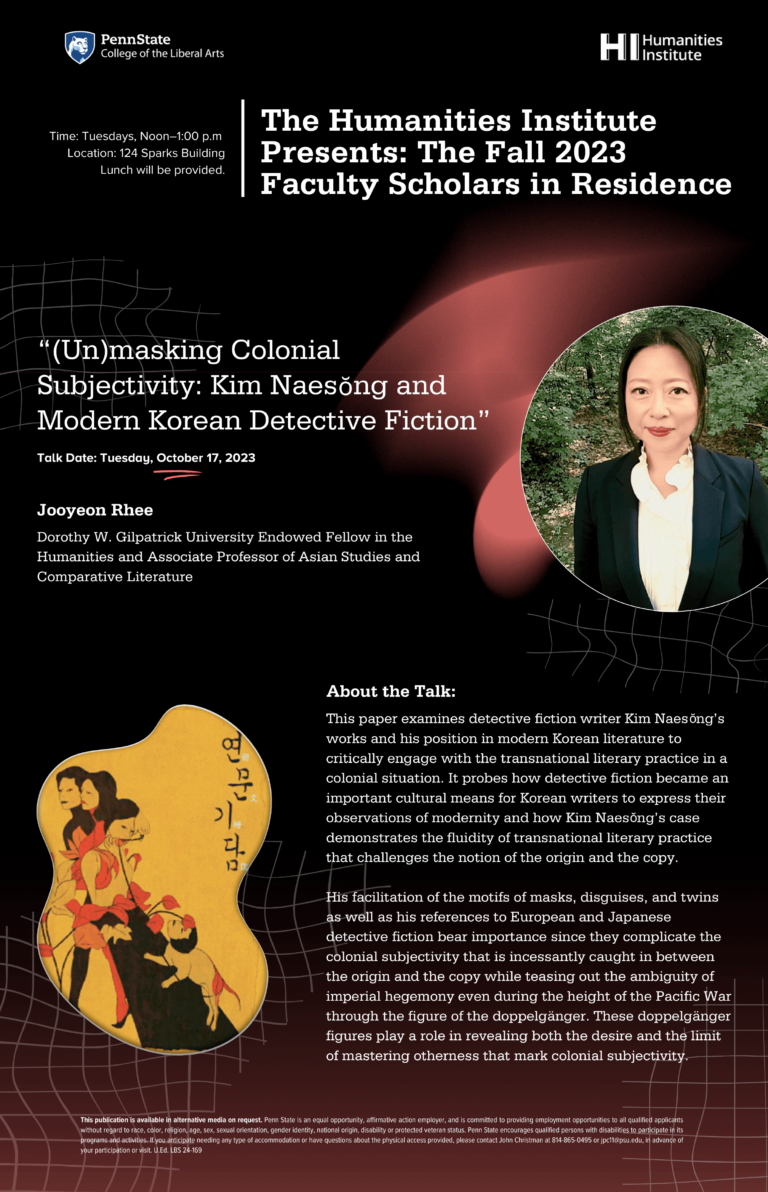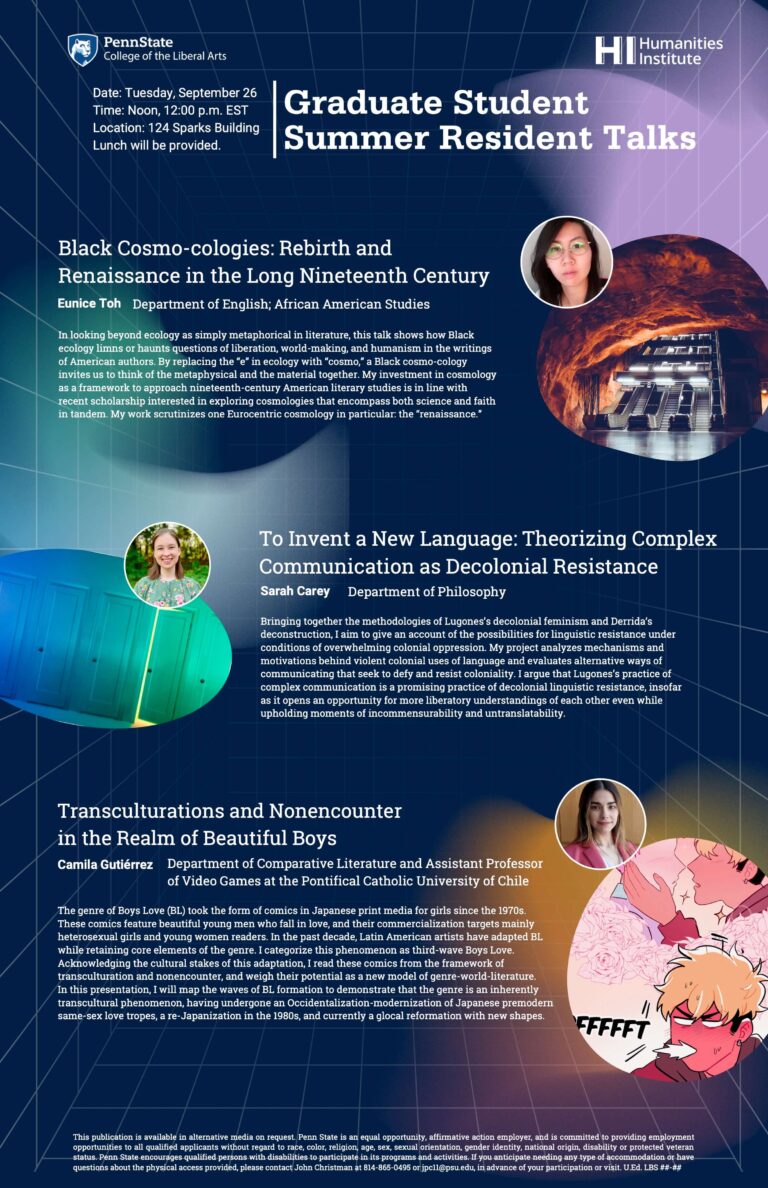Spring 2024
Greg Eghigian
Professor of History and Bioethics
“Carried Away? Belief, Truth, and Trauma in the Alien Abduction Phenomenon”
February 13th Noon- 1:00 p.m. 124 Sparks Building
During the last quarter of the twentieth century, a growing number of people came forward claiming to have been abducted by terrifying extraterrestrials. The phenomenon sparked an often acrimonious debate about how best to weigh the fidelity of extraordinary claims, the trustworthiness of witnesses, and the legitimacy of personal beliefs.
Observers on all sides turned to the fields of psychology, psychiatry, and psychotherapy to alternatingly support and undermine the claims being made. In a situation where fantastic assertions were buttressed by heartfelt convictions, many looked to the concept of trauma to resolve matters, seeing in its presence or absence a way to decide on the authenticity of aberrant experiences and memories. What might the case of alien abduction offer by way of insights into the possibilities and limitations of using trauma and science to arbitrate subjective truths?
Janet Neigh
Associate Professor of English, Penn State Behrend
Repairs Pending: Caribbean Street Poetics and the Decolonial Imaginary
February 20th Noon- 1:00 p.m. 124 Sparks Building
Many important works of anglophone Caribbean poetry, particularly performance and vernacular-based work, takes place in the street. The focus on street life extends across the twentieth century, both in the Caribbean and in the diaspora, ranging from Claude McKay’s ballads written in the voice of a constable as he walks his beat to Louise Bennett’s market women demanding space and recognition at crowded intersections to Dionne Brand’s documentation of microaggressions and alienation in the streets of Toronto. The fact that so many poems take place in the street, or draw inspiration from its sights and sounds, makes sense given the prominence of street-performance culture in the region. However, this is only part of the story. This talk uncovers how the colonial violence of infrastructure—both in the material environment and in the literary realm—played an antagonistic role in the development of street poetics.
Fabienne Kanor
Marian Trygve Freed Early Career Professor
Associate Professor of French and Francophone Studies
Writer and filmmaker
TALES FROM THE HOLD – Episode 2: The Last Ship
February 27th Noon- 1:00 p.m. 124 Sparks Building
“When not forgotten by history, when not dissolved by the sea, when not strewn by the wind, the « revenants » return”. My experimental documentary series project Tales From the Hold poses and holds this question: What remains of the Africans swallowed up in the belly of the Atlantic Sea, and in the nothingness of the colonial plantations? How can I find their traces through time and space? How to rescue them from oblivion and bring them back to us? As I began filming the third episode of my collection, titled “The Last Slave Ship”, in Benin, West Africa, I take a break to present my current work and look back to the genesis of my project.
Sabine Doran
Associate Professor of German and Jewish Studies
Dyeing for the Revolution: Towards an Ethics of Coloring
March 12th Noon- 1:00 p.m. 124 Sparks Building
Stagings of “marooners’ calls” in artistic engagements as different as Walker’s A Subtlety, Haile Gerima’s Sankofa, and John Akomfrah’s Tropikos revisit the process of sugar’s crystallization: “Thank you for letting me know that sugar is not white,” reads the first intertitle of the “digital sugar baby’s archive” (Walker). This talk will examine sugar’s crystal image as a reflection of the cooling of heated matter (molasse) on which the process of sugar’s crystallization depends. A process that will allow us to address climate change in terms of what Derrida called (in Cinders) “the holocaust’s holocaust, the blaze reflected and cooled by the glass, the ice, of the mirror.”
Kobi Kabalek
Assistant Professor of Holocaust Studies and Visual Studies
Germanic
and Slavic Languages and Literatures
Jewish Studies
Holocaust Horror: A Cultural History
March 19th Noon- 1:00 p.m. 124 Sparks Building
My project explores Holocaust victims’ horror depictions in order to unravel their authors’ contemplations of the very definition of humanity and the borders of rationality and civilized sociality. Whereas the study of the Holocaust has used such concepts as “civilizational rupture” (Dan Diner) to describe the change that this genocide has caused to people’s perceptions, expectations, and anxieties in modern societies, it has rarely sketched the meanings and origins of such conceptualization. My study pursues these issues by tracing the cultural roots, functions, and implications of civilization and barbarism since WWII through a close analysis of the Holocaust as horror.
Dara R. Walker
Assistant Professor of African American Studies,
History,
and Women's, Gender, and Sexuality Studies
Between Protection and Agency: Writing Black Adolescence into Histories of the Black Power Movement
April 2nd Noon- 1:00 p.m. 124 Sparks Building
While historians have refined popular and scholarly ideas about the role of race, class, gender, and sexuality in the development and trajectory of the Black Power movement (1966-1982), the Black adolescents who came of age as activists of this global struggle remain on the margins of this history as adolescents. Scholars have revealed that Black independent schools established during those years were concerned about developing racial pride in Black children, providing them with food, and ensuring their access to other basic needs, but were the adolescent activists who took over school buildings indoctrinated, unprotected teens or fully autonomous actors? In this social and intellectual history of Black high school-aged activism in Detroit, I argue that marshaling age as a useful category of historical analysis sharpens our understanding of the movement’s ideas about Black adolescence and the role of teenaged youth in the movement. Furthermore, this project troubles this binary understanding of adolescent political actors as it reveals the movements’ efforts to navigate the double bind of youth protection and youth agency.
Graduate Student Resident Talks
Tuesday, April 9th at Noon-1:00 p.m. 124 Sparks Building. Lunch will be provided.
Zinhle Ka’Nobuhlaluse
Department of Philosophy, Department of Women’s, Gender, and Sexuality Studies
Rioting As Writing, Writing As Rioting: Locating a South African Black feminist thought in the autobiographies of Blackwomen anti-Apartheid freedom fighters
It is generally known that Apartheid in South Africa was an oppressive system. However, the intelligibility of the system and our philosophical approaches to Apartheid as a system with multiple and intersecting forms of oppression remain undertheorized, and the system’s complexities remain unknown. My project argues that prioritizing the lived experience of marginalized persons with intersecting identities makes the system intelligible. My presentation focuses on the dissertation’s final chapter, which draws on the dialogical relationship between rioting women, the anti-Apartheid activists Caesarina Kona Makhoere and Mamphela Ramphele, and their writing in the form of the autobiography. I argue that the dialogical relation is embedded in a dialectical method that registers a South African Black Feminist thought. This is to say, it is only by rioting against Apartheid that they are able to write about it, as a system. Their writing is also an act of rioting against the system insofar as it was illegal for Black people to engage in this type of writing. This project is a timely intervention into global circuits of knowledge that undermine (South African) Blackwomen’s knowledge.
Su Young Lee
Department of English, Department of Women’s, Gender, and Sexuality Studies
Imagining Elsewheres: Speculating the Asian Diaspora in North America, Australia, and Aotearoa New Zealand
In this project, I argue Asian America and other Asian diasporas in the West can learn from each other and imagine a cross-disciplinary political formation against globally circulated forms of anti-Asian racism. Though Asian American studies and other studies of the Asian diaspora are considered distinct fields that do not overlap because of emphasis on individual national contexts and because Asian American studies has a longer and more prominent history as a field, I imagine alternative groupings of conversations from traditional categories of knowledge and cultural production that are based on geography or the nation-state. Looking to forms of fiction loosely defined as speculative that help imagine alternative relationalities, I explore how understandings of these Asian diasporas might be reconfigured around affective experiences, temporary or event-based affiliations, or more-than-human entanglements with nonhuman species that do not adhere to these boundaries.
Brooke Tybush
Departments of French and Francophone Studies, Department of Women's, Gender, and Sexuality Studies
From Ouadramé to Maïssa: Searching for the Signares in Early Modern Archives
Rather than viewing Arabic and Persian literature written post 1980 as a vehicle for nationalism or political criticism, I bring these two traditions together through the dual concept of embodiment and dispossession. By engaging different literary genres of six dispossessed writers from the Gulf, I argue that their distinct portrayal of dispossession reframes the literary scene in its attentiveness to the body. Depictions of embodied dispossession expose the way colonial capitalism instrumentalizes statelessness, expatriation, gender, and racialized indigeneity to uphold social reproduction. They simultaneously build a corpus of embodied knowledge that precludes full co-option by the system. I ultimately advocate for a “visceral and parietal poetics” that invites us to see how this literature reimagines sovereign power, geopolitical borders, and tokenistic representation.
Stay tuned for information on the remaining talks this Spring 2024!
Fall 2023
Graduate Student Resident Talks
Tuesday, November 7th at Noon-1:00 p.m. 124 Sparks Building. Lunch will be provided.
Edward Green
Department of History
Choctaw Diplomacy, Interdependency, and Nation Building: Towards a Theory of “Quotidian Power
This project examines the ways that ideas of power were negotiated, developed, and contested in the Choctaw Nation from the early eighteenth through the middle of the nineteenth century. By showing Choctaws’ deliberate pursuits of national and international politics that welcomed local decision making and relations of interdependence, I encourage a fundamental reconceptualization of familiar ideas of nation building and development. Choctaws maintained both their sovereignty and many of their foundational lifeways in the face of increasingly violent Euro/American colonialisms that demanded an end to both. Recognizing this persistence as resistance forces us to center the experience of power in the everyday as the most important lens in understanding the ways that societies develop.
Matthew J Douthitt
Department of History
Clandestine China: Extraterritorial Violence and the National Revolution Abroad, 1895-1919
This talk explores seldom-discussed yet pervasive incidents of extraterritorial violence during the Xinhai Revolution of 1911. State-centric narratives tend to portray the overthrow of the Qing Dynasty as a relatively bloodless coup led by traveling nation-builders like Sun Yat-sen. This misguided assumption obscures the turbulent nature of partisan violence in favor of linear storytelling and the elevation of national heroes. In actuality, a clandestine network of Chinese émigrés enabled acts of extraterritorial violence across the wider Pacific region. By using popular violence as a framework, my research seeks to recontextualize the revolutionary role of the migrant working-class, nonstate actors, and illicit organizations in the antimonarchical revolution.
Hanan Al-Alawi
Department of Comparative Literature and Women’s, Gender, and Sexuality Studies
Visceral and Parietal Poetics in Contemporary Arabic and Persian Literature in the Gulf
Rather than viewing Arabic and Persian literature written post 1980 as a vehicle for nationalism or political criticism, I bring these two traditions together through the dual concept of embodiment and dispossession. By engaging different literary genres of six dispossessed writers from the Gulf, I argue that their distinct portrayal of dispossession reframes the literary scene in its attentiveness to the body. Depictions of embodied dispossession expose the way colonial capitalism instrumentalizes statelessness, expatriation, gender, and racialized indigeneity to uphold social reproduction. They simultaneously build a corpus of embodied knowledge that precludes full co-option by the system. I ultimately advocate for a “visceral and parietal poetics” that invites us to see how this literature reimagines sovereign power, geopolitical borders, and tokenistic representation.
Rebecca Haddaway
Center & Institutes Humanities Dissertation Release Graduate Scholar Departments of English and Visual Studies
Geographical Visualities of Race and Health in Antebellum U.S. Culture
Medical illustrations in the eighteenth and nineteenth centuries dismembered the human body, establishing a way of seeing embodiment that enabled pro-slavery American physicians to dehumanize or selectively humanize enslaved experimental subjects and patients. In my talk, l propose that abolitionists envisioned the human body differently from pro-slavery peers, constructing alternative pathways for medical knowledge and practice based on the idea that bodies were human because of their proximity to spaces of belonging. Abolitionists visualized and oriented the body through the body, creating a counter-cartographic imaginary of health that navigates healing and coalition in American and transatlantic contexts including bodysnatching and debates over the medical use of dead bodies, the origin and transmission of yellow fever, and the Haitian Revolution.
Linda Istanbulli
Caroline D. Eckhardt Early Career Professor of Comparative Literature
Assistant Professor of Comparative Literature
Unravelling the Nation: Criticality and Agency in Contemporary Syrian Women’s Fiction
Tuesday, October 24th at Noon-1:00 p.m. 124 Sparks Building. Lunch will be provided.
Through the lens of contemporary Syrian women’s fiction, my project reflects on the crisis of nationhood in the Arabic speaking world and on the ways in which the novel as a genre both reflected and created the conditions of possibility for the 2011 uprisings known as the Arab Spring.
I propose that with the advent of the new millennium, a new generation of women novelists in Syria spearheaded an investigation into both the nation and the novel as male-constructed spaces. Evoking histories and sensibilities that literary, epistemological, and political authorities aim to repress or reshape, their works interrogate the totalizing models that a previous generation of intellectuals produced, the genealogies they constructed for Arab modernity and its normative interpretation of the world in terms of identity, secularism, and nationalism. Tracing what I term as an “aesthetic of unraveling,” I tarry with these women authors’ use of innovative literary practices, which, I suggest, enable them to contest history; undermine the notion of an unquestionable authority); and re-gender the multicultural spaces within the Syrian collective.
Jooyeon Rhee
Dorothy W. Gilpatrick University Endowed Fellow in the Humanities
Associate Professor of Asian Studies and
Comparative Literature
(Un)masking Colonial Subjectivity: Kim Naesŏng and Modern Korean Detective Fiction
Tuesday, October 17th at Noon-1:00 p.m. 124 Sparks Building. Lunch will be provided.
This paper examines detective fiction writer Kim Naesŏng’s works and his position in modern Korean literature to critically engage with the transnational literary practice in a colonial situation. It probes how detective fiction became an important cultural means for Korean writers to express their observations of modernity and how Kim Naesŏng’s case demonstrates the fluidity of transnational literary practice that challenges the notion of the origin and the copy.
His facilitation of the motifs of masks, disguises, and twins as well as his references to European and Japanese detective fiction bear importance since they complicate the colonial subjectivity that is incessantly caught in between the origin and the copy while teasing out the ambiguity of imperial hegemony even during the height of the Pacific War through the figure of the doppelgänger. These doppelgänger figures play a role in revealing both the desire and the limit of mastering otherness that mark colonial subjectivity
Graduate Student Summer Resident Talks
Tuesday, September 26th at Noon-1:00 p.m. 124 Sparks Building. Lunch will be provided.
Eunice Toh
Department of English; African American Studies
Black Cosmo-cologies: Rebirth and Renaissance in the Long Nineteenth Century
In looking beyond ecology as simply metaphorical in literature, this talk shows how Black ecology limns or haunts questions of liberation, world-making, and humanism in the writings of American authors. By replacing the “e” in ecology with “cosmo,” a Black cosmo-cology invites us to think of the metaphysical and the material together. My investment in cosmology as a framework to approach nineteenth-century American literary studies is in line with recent scholarship interested in exploring cosmologies that encompass both science and faith in tandem. My work scrutinizes one Eurocentric cosmology in particular: the “renaissance.”
Sarah Carey
Department of Philosophy
To Invent a New Language: Theorizing Complex Communication as Decolonial Resistance
Bringing together the methodologies of Lugones’s decolonial feminism and Derrida’s deconstruction, I aim to give an account of the possibilities for linguistic resistance under conditions of overwhelming colonial oppression. My project analyzes mechanisms and motivations behind violent colonial uses of language and evaluates alternative ways of communicating that seek to defy and resist coloniality. I argue that Lugones’s practice of complex communication is a promising practice of decolonial linguistic resistance, insofar as it opens an opportunity for more liberatory understandings of each other even while upholding moments of incommensurability and untranslatability.
Camila Gutiérrez
Department of Comparative Literature
Transculturations and Nonencounter in the Realm of Beautiful Boys
The genre of Boys Love (BL) took the form of comics in Japanese print media for girls since the 1970s. These comics feature beautiful young men who fall in love, and their commercialization targets mainly heterosexual girls and young women readers. In the past decade, Latin American artists have adapted BL while retaining core elements of the genre. I categorize this phenomenon as third-wave Boys Love. Acknowledging the cultural stakes of this adaptation, I read these comics from the framework of transculturation and nonencounter, and weigh their potential as a new model of genre-world-literature. In this presentation, I will map the waves of BL formation to demonstrate that the genre is an inherently transcultural phenomenon, having undergone an Occidentalization-modernization of Japanese premodern same-sex love tropes, a re-Japanization in the 1980s, and currently a glocal reformation with new shapes.
